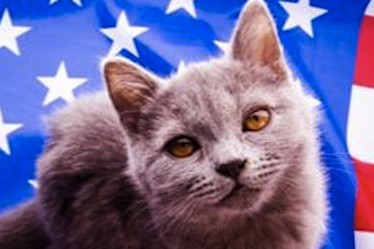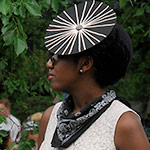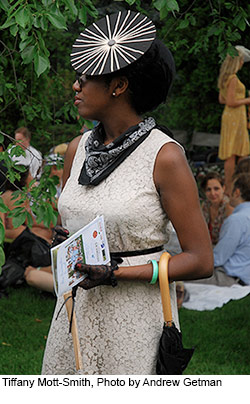


My introduction to my first queer community is, well, precious. It goes like this: Sheltered girl meets not-so-sheltered girl and freaks out about the giant middle finger she’s given to gender conformity. Then, sheltered girl bakes pies for not-so-sheltered girl, while they chat furiously and fool around on her couch. Community building at its best!
Two people could not have been more different. However, no one questioned us wanting to hang out together. This is likely because at the time, we were living in Michigan, where, from my count, there were approximately four and one-half queer people. Segregation was not an option. We were dykes, and that trumped everything.
I moved to Washington, D.C., with a plan: First, find the queer “grrls.” Second, roll around in the safe spaces. Instead, I found that my new community’s safe spaces were unsafe in their own ways. The separation was glaring, and I quickly grew tired of deciding which group I would hang out with every weekend.
When I began to invite people to events, I immediately received responses like these: “That place is racist, and I don’t go where I’m not wanted,” and “They don’t like trans dudes there.” Other times, I would hear, “That event is only for queers with money, sweetheart.”
Recently, a friend who grew up in Petworth proclaimed that she was moving from the DMV area entirely. In her words, “I go to one spot, and I’m too hype. I go to another spot, and I’m too quiet. I’m over it.”
 I even collected some of my own unsettling experiences with segregation—such as the time one of my fellow femmes asked me not to market a queer-friendly Catholic midnight mass we were attending. When I asked her why, she responded, “Well, we don’t want just anyone showing up.”
I even collected some of my own unsettling experiences with segregation—such as the time one of my fellow femmes asked me not to market a queer-friendly Catholic midnight mass we were attending. When I asked her why, she responded, “Well, we don’t want just anyone showing up.”
Once, at a party, an admittedly adorable girl stopped herself in mid-flirt with me, acknowledging that while she found me attractive, she didn’t date black women. Another time, while explaining that I grew up being told that Howard University is the Harvard of Historically Black Colleges and Universities, I was met with a simple, “Wow. I just thought you guys had a better school somewhere.”
To be fair, my unsettling experiences with segregation have been offset heavily by opportunities to be an ally in some way, shape, or form. But what alarms me is the idea that my people would ever engage in “othering” behavior with one another. Surely, we haven’t decided it’s cool and edgy to divide and conquer ourselves in a time where D.C.’s LGBTQ population is enjoying the most broadly applying institutionalized liberties and protections in U.S. history.1
Admittedly, I have a bone to pick with separatism and segregation. I am, however, a black woman from Detroit, and as such, I have a bone to pick with just about everything. So, rather than hopping on a soapbox, I will simply propose a few requests.
To my dear fellow queers and future lovers: Get. It. Together. Hug one another more. Love one another more. Trust one another more. Respect one another more. Show up to the spaces you are nervous about and welcome the people you aren’t used to seeing.
Our community is awesome. It’s the reason so many of us from places where hate crime is a verb and living wages are rare have come here. We are black, white, brown, red, yellow, Catholic, atheist, working class, hipster, union, yuppie, vegan, nerdy, punk, natural haired, quick weaved, trans, femme, butch, conservative, progressive, socialist, anarchist, liberal—the list goes on and on. But most important, we are queer, and that trumps everything.
1. In addition to protecting marriage equality, Washington, D.C., currently has two municipal codes protecting LGBTQ individuals from hate crimes and discrimination in areas of employment, schools, housing, and public accommodations. The city also has a municipal code permitting trans individuals to amend their birth certificates.